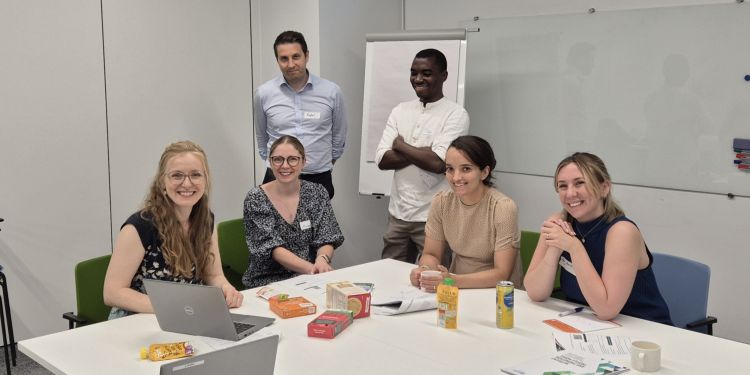Researchers share data expertise with local guests

On Friday 11th July, we welcomed delegates from local government, industry, healthcare and academia to showcase some of the data tools we have developed in the School of Food Science and Nutrition.
Funded by a grant from the Faculty of Environment, the event was designed not only to inform attendees about the tools we have developed but also to demonstrate ways these tools could change how organisations and wider society use data in food.
Over coffee and pastries, we heard an introduction from Professor Ed Manley, Pro-Dean for Research and Innovation in the Faculty of Environment and Professor of Urban Analytics in the School of Geography, whose research uses new forms of data and computational methods to capture how spatial behaviours shape urban activity and dynamics.
After that, academics from the School of Food Science and Nutrition talked about their data tools, giving insights into their value and use.
Dr Diane Threapleton, Senior Research Fellow in Nutrition and an expert in child, infant and maternal health and public health nutrition, talked about the Nutrient and Promotion Profile Model (NPPM), a World Health Organisation-developed tool which assesses the appropriateness of commercial baby foods.
NPPM evaluates both the nutritional content and promotional aspects of these products. Dr Threapleton’s talk was not only fascinating but scary; in particular, hearing about the “Wild West” of baby foods’ nutritional values and on-packet information was eye-opening.
Professor Michelle Morris, Professor of Data Science for Food with a background spanning health informatics, geography, nutritional epidemiology and health economics, introduced The Nutrient Profile Model online calculator, a nutrient profile assessment which makes scoring easier and quicker, promoting consistency and informing decision-making whilst checking compliance with High in Fat, Salt and Sugar (HFSS) legislation in England.
Professor Morris highlighted both the strengths of the current HFSS legislation and areas where it needs work, offering opportunities for retailers to have confidence when following legislation.
Professor Janet Cade, who leads the Nutritional Epidemiology Group and whose expertise includes nutritional epidemiology, dietary assessment methodologies and public health nutrition, talked about myfood24.
Myfood24 is a dietary assessment tool and a University spin-out company which aims to reduce rates of diet-related diseases across the globe.
Professor Cade showed us the accuracy of myfood24 compared to other dietary assessment tools, which was incredible to see in an area where confidence in accuracy is hugely important. Diet is complex, and so is the data!
Professor Kieran Tuohy, Professor of Energy Metabolism and Microbiome and expert in the gut microbiota, pro- and pre-biotics and fermented food, demonstrated the UK Probiotics Chart and Database. The database provides ready access to the scientific publications supporting different commercially available probiotics on the UK market. As the probiotic market expands rapidly, misinformation and confusion are rampant; being able to direct people to the science behind the marketing claims and promotions will offer evidence-based guidance.
Professor Michelle Morris also shared the Priority Places for Food Index (PPFI), a composite index formed of data compiled across seven domains, in England, Scotland, Wales and Northern Ireland.
Its goal is to identify neighbourhoods that are most vulnerable to increases in the cost of living and which have a lack of access to cheap, healthy and sustainable sources of food, making them a Priority Place for Food.
After a delicious lunch, delegates had a chance to try the tools out themselves! This generated lots of interesting conversations and insights from academics and from attendees, many of whom had new perspectives to share.
At the end of the day, we had a group discussion where people online and in person shared what they had learnt about data in food.
Comparing poll answers at the beginning of the day to answers at the end of the day, we captured feedback, and the real-world impact was clear to see.
Over the day, delegates grew in confidence regarding their use of data in food within their professional roles; 28% of respondents were “very confident” in the morning, and by the afternoon, this had risen to 60%!
Delegates commented on probiotics as a potential treatment for gut-eating bacteria in premature babies, ways to improve mapping of health outcomes and the local and national levels, and they were interested in how the tools could bring more clarity about the nutritional status of the food we buy for ourselves and our families.
We will be highlighting the data tools further in the coming weeks and sharing the workshop resources so that anyone interested can have a go themselves!
Please keep an eye out and get in touch if you have any questions by emailing Imogen Lyons (i.r.i.lyons@leeds.ac.uk).
In a world filled with misinformation, misleading slogans and outright fibs, communication from a robust evidence base is more important than ever to ensure we have the right tools to improve diet, nutrition and health.







